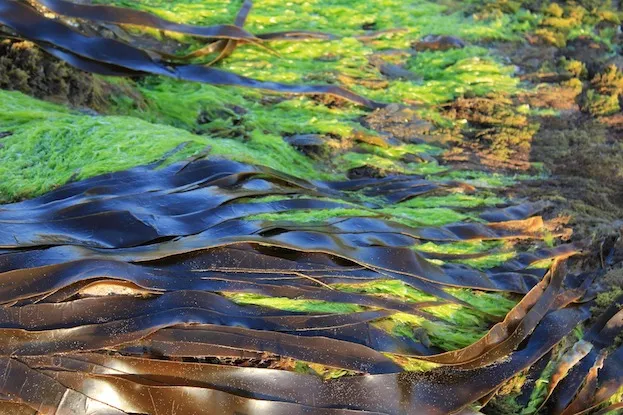In Scotland kelp can only be hand cut with a license from the Crown Estate with strict guidelines on preserving the plant.
These guidelines instruct the hand harvester to cut the kelp above the meristem (part of the plant responsible for growth) and leaving certain parts of the plant intact ensuring the kelp a chance to regenerate.
While the benefits of sustainably harvested kelp have previously been as a valuable food source for all sorts of animals, there is now a rising demand from small food and cosmetic businesses.
The scoping report put forward by Ayr-based Marine Biopolymers Ltd, explains its intentions to extract natural polymers from the seaweed for uses in foods and pharmaceuticals. It would harvest the kelp through a dredging process.
The proposed processing plant would be established in Mallaig, in the west Highlands. Under the plan, the amount of kelp harvested would rise over the years from about 1,300 tonnes wet weight to 30,000 tonnes.
In the report, Marine Biopolymers said it would avoid sensitive marine environments, and that areas of seabed would not be re-harvested within a given time period to allow the seaweed to recover.
It provided images of a freshly trawled track showing small juvenile kelp plants that are not removed by the harvesting comb, and with untouched mature plants, as evidence of similar kelp harvesting in Norway.
However, kelp and seaweed farmer Ailsa McLellan, a member of the Scottish Seaweed Industry Association expresses her concerns for the kelp beds: “At the moment the beds are pristine, they have been evolving for thousands of years; that is not the sort of habitat that can recover in the short term.
“The new habitat would be more homogeneous than before with plants of the same age, and homogeneity is the enemy of biodiversity.
“Biodiversity is what supports our coastal fisheries and life.”

In anticipation of receiving the marine licence applications for wild seaweed harvesting, Marine Scotland carried out a Strategic Environmental Assessment (SEA).
Large kelp forests like the ones present on the west of the Outer Hebrides can protect the coasts from storm damage by reducing the wave energy reaching land.
This SEA concluded that wild seaweed harvesting could be undertaken sustainably, subject to the incorporation of mitigation measures and with appropriate monitoring to facilitate adaptive management.
Scottish National Heritage was asked to provide advice to Marine Scotland to inform a scoping opinion of Marine Biopolymers' proposal for large scale mechanical kelp harvesting.
In a statement it said: “As it is currently written, we are unable to provide this advice. Kelp plays a vital role in providing habitats for juvenile fish, protecting coasts from erosion, and carbon storage.
“The report does not currently provide enough detail for us to advise on how to assess the environmental impacts of the proposal on this important marine habitat.”
Whether Marine Biopolymers’ plans go further will depend on marine licensing being agreed and the decision of Scottish ministers.
Click here for the full report lain out by Marine Biopolymers Ltd.
You can read the full Scottish National Heritage response here.